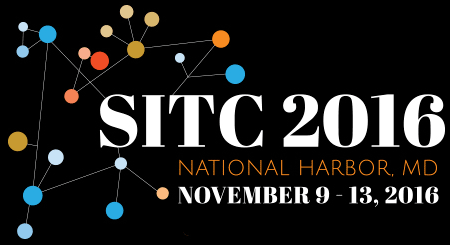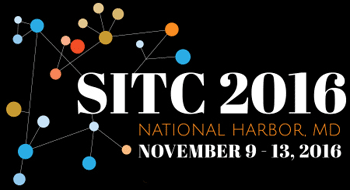Tumor Microenvironment
Neuropilin-1-deficient regulatory T cell-derived interferon-γ drives infectious instability and tumor clearance
To investigate the role of neuropilin-1 (Nrp1) in the tumor microenvironment (TME), Abigail E. Overacre-Delgoffe (University of Pittsburgh) utilized a model of melanoma in Nrp1L/LFoxP3Cre-YFP/DTR-GFP mice in which half of the Treg are wild-type (WT) and half are Nrp1-deficient. Treg lacking Nrp1 were found to produce significantly more interferon-γ (IFNγ) than WT Treg, which led to functional impairment of adjacent WT Treg in the TME. The loss of suppressive function experienced by WT Treg due to Nrp1-/- Treg-derived IFNγ was sufficient to allow for clearance of B16.F10 melanoma cells by anti-tumor immunity. The importance of this signaling pathway was also apparent in humans, as Treg in the peripheral blood and within the tumors of patients with melanoma and head and neck squamous cell carcinoma were shown to express Nrp1, which correlated with poor prognosis. Moreover, the ability of human WT and Nrp1-/- Treg to suppress effector cells was significantly impaired when cultured with IFNγ, further supporting Nrp1 as a potential therapeutic target.
CD8α+ dendritic cells regulate leukemia antigen-specific CD8+ T cell tolerance
Batf3+ and CD103+ DC found in tumor-draining lymph nodes (LN) or tertiary lymphoid structures (TLS) are required for the generation of a potent CD8+ T cell response against solid tumors. However, Justin Kline, MD (University of Chicago) noted that the lack of draining LNs in hematologic malignancies precludes potentiation of an immune response in these cancers. Using a transplantable murine model of acute myeloid leukemia (AML) in which tumor antigen-specific CD8+ T cells undergo deletional tolerance, the aim of this study was to understand how antigen-specific immune responses are mounted or blunted in the setting of systemic malignancy. This study found that only the cross-presenting CD8α+ CD11c+ DC engulf AML-derived cellular material, and these professional antigen-presenting cells (APC) are required for the AML antigen-specific priming and expansion of CD8+ T cells in vitro. CD8α+ DC were also found to be responsible for the systemic induction of CD8+ T cell tolerance in vivo, and although this mechanism remains undefined, investigators noted a striking difference in gene expression profiles between DC that had taken up cellular material from AML and those that had not. Activation of CD8α+ DC with a TLR3 agonist was sufficient to break AML-induced tolerance allow CD8+ T cells to mount an effective anti-tumor response.





Important Dates
Regular Abstracts Published in JITC
November 8, 2016
Late-Breaking Abstracts Published in JITC
December 8, 2016
Thank You, Supporters!
Thank you, SITC 2016 supporters. Because of your generosity, SITC 2016 was a great success!
Interested in supporting other SITC programs? Confirm your support today!


Connect with SITC!